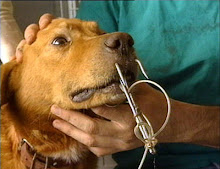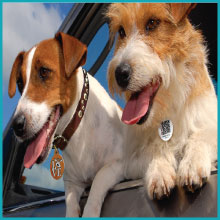Dog Brains Being Changed By Breeding
For the first time, scientists have shown that selective breeding of domestic dogs is not only dramatically changing the way animals look but is also driving major changes in the canine brain.
The brains of many short-snouted dog breeds have rotated forward as much as 15 degrees, while the brain region controlling smell has fundamentally relocated, researchers from the University of New South Wales and University of Sydney have found.
The large variations in dog skull size and shape follow more than 12,000 years of breeding for functional and aesthetic traits.
The discovery of such dramatic reorganisation of the canine brain raises important questions about impacts on dog behavior.
The research is published this month in the Public Library of Sciences journal PLoS One.
Researchers from UNSW's Brain and Ageing Research Program and Sydney University's Faculty of Veterinary Science used magnetic resonance imaging (MRI) to look at brains across a range of breeds.
"We found strong and independent correlations between the size and shape of a dog's skull, and brain rotation and the positioning of the olfactory lobe," said study co-author, Dr Michael Valenzuela, from UNSW's School of Psychiatry
"As a dog's head or skull shape becomes flatter - more pug-like - the brain rotates forward and the smell centre of the brain drifts further down to the lowest position in the skull," Dr Valenzuela said.
No other animal has enjoyed the level of human affection and companionship like the dog, nor undergone such a systemic and deliberate intervention in its biology through breeding, the authors note. The diversity suggests a unique level of plasticity in the canine genome.
"Canines seem to be incredibly responsive to human intervention through breeding. It's amazing that a dog's brain can accommodate such large differences in skull shape through these kinds of changes - it's something that hasn't been documented in other species," Dr Valenzuela said.
Health impacts from breed specific disorders - such as pug encephalitis and hip problems in German shepherds - are well documented; however, until now little had been known about the effects of human intervention on dogs' brains.
Co-author Associate Professor Paul McGreevy from the University of Sydney noted: "We think of dogs living in a world of smell - but this finding strongly suggests that one dog's world of smell may be very different from another's."
"The next obvious step is to try to find out if these changes in brain organisation are also linked to systematic differences in dogs' brain function," Dr Valenzuela said.
Source:
Dr. Michael Valenzuela
University of New South Wales
Thursday, August 5, 2010
Subscribe to:
Post Comments (Atom)

















No comments:
Post a Comment